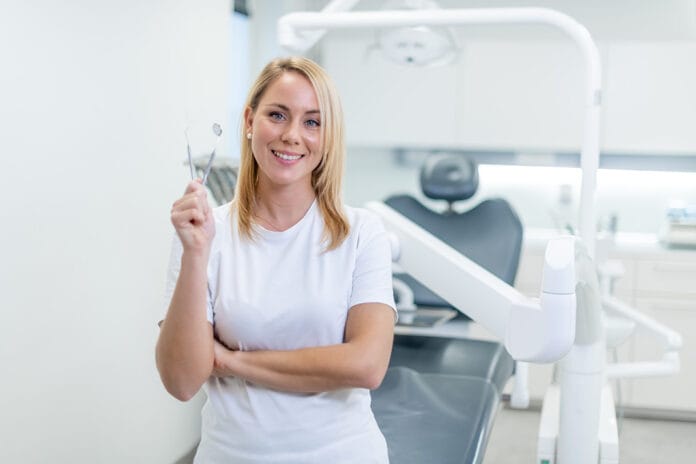Throughout my career as a dental hygienist, I’ve gone through a wide range of phases regarding how I feel about the job. Sometimes, I absolutely despise the work, struggling with physical pain, mental exhaustion, and an overwhelming sense of repetitiveness. During other periods, I feel extremely happy and firmly believe hygiene is the best possible option I could have taken. Following those completely opposing emotions, I often feel decidedly indifferent, as if the days flow together with no real emotion, good or bad.
As I’ve faced the ebbs and flows of this uniquely challenging career, I’ve slowly learned several important lessons that I consider to be the “golden rules” for weathering these phases and creating a healthy relationship, not only with my patients but also with myself.
Golden Rule #1 – Find Your Strength
“You need to learn to not ask so much permission – be more confident and less, ‘Mother, may I?'”
I can still remember my instructor saying these words to me as I confessed my feelings of confusion and failure as a hygiene student. Dental hygiene was a path I had chosen at a young age, mainly due to my older sister paving the way and recommending it, and it was definitely not a choice born out of passion or interest.
As I navigated the absolutely crippling stress that is hygiene school, I realized, my heart sinking, that I was not very good at hygiene ‒ at least, not easily or very quickly. I was 20 years old at the time, and my naïve brain didn’t even consider dropping out and choosing something that aligned more with my interests at the time, which lay in creativity, the arts, psychology, and basically anything nontechnical.
My instructor’s words hurt, and I did my best to follow what she was saying, trying to “fake it until I made it.” This worked long enough to get me through school, start my first job, and settle into my chosen career path. As time went on, I began receiving positive feedback from patients, coworkers, and bosses, which slowly boosted my confidence; however, in truth, I was rather miserable.
It wasn’t until I later took time off from dental hygiene, separated myself from it for a few years to travel abroad and explore new places, and returned to it that I unexpectedly found my groove.
Upon returning to the USA, I spent two years practicing as a temp hygienist, enjoying the freedom of schedule it gave me and helping me not to feel confined to the career as much. This was an unquestionably invaluable period of time as a hygienist. It taught me to think of each patient as a unique experience since I might never see them again. It showed me that I have to find my absolute staples that I must include in treatment, no matter which setting I am in. It pushed me to learn from a variety of offices about different atmospheres and practices and to keep what I appreciated and leave behind what I didn’t.
I learned that my strength lies in making each patient feel personally seen and cared for, giving thorough treatment, and educating patients simply and effectively about their oral health status and habits. I learned that I might not be as comfortable taking radiographs, giving injections, or necessarily staying on time. Those are things I can and continue to work on. But I learned to accept my weaknesses in hygiene and to embrace my strengths.
Through trial and error and in having to feel uncomfortable in new environments every day as a temp, I found a home base and a confidence in myself in a way that I was never able to before. The biggest surprise to me was that my heart softened to hygiene, and I unexpectedly fell in love with it.
Understand your weaknesses and work on them. Recognize your strengths and enhance them. Each hygienist brings something unique to their position, and no one can be perfect at each part of the job. Find your strength.
Golden Rule #2: Form a Connection
I imagine every one of us has been involved in an interaction with someone where the person in charge acts almost robotic, more often than not, during medical appointments. Hearing the monotonous tone in which they greet you and talk to you throughout the encounter creates an uncomfortable awareness of how often they repeat the same words and how little they truly acknowledge you as an individual or are actually being present in the current situation.
Three things that continually make me feel, personally, as if I’m just another number in line are when the person talking to me doesn’t make much eye contact, when their tone of voice is colorless, and when they talk only of themselves or ask only basic questions with no extra thought.
Let’s start with eye contact. Eye contact is a significant nonverbal social cue that can project confidence, self-esteem, and purposefulness. According to a study from the Idiap Research Institute, eye contact shows a person’s social position and authority in a conversation. The study found that people at the top of the hierarchy order often look longer at their subject and receive more eye contact in return.1
Unfortunately, utilizing this simple, effective tool does not happen as often as it could. A communications-analytics company, Qualified Analytics, states, “Overall, adults only make eye contact 30% to 60% of the time when speaking to individuals or groups. However, they should really be making eye contact 60% to 70% of the time to create an emotional connection.”2 According to the article, there were various reasons why lack of eye contact occurs, such as increased usage of mobile devices and multitasking, discomfort with social situations, and general distractions.2
Another important aspect of body language is the speaker’s tone of voice. Using a deep tone of voice has been shown to imply maturity and can create trust in other people. It can hint toward the type of relationship a person wants to have with another. For example, if one’s voice is cold and sharp, it can feel as if they want to establish distance. If the sound of the voice is warm and gentle, it contributes to the subject feeling safe and calm.3
A third part of making a connection is finding common ground with your patient. A well-known amusing but true phrase is, “People love the sound of their own voice.” The more insightful and caring questions you ask patients, the more they may open up to you. Try to keep small notes about what they tell you so you can check in with them at the next appointment.
Take the time to get to know them, within professional reason, being careful not to take up more than a few minutes, and avoiding inquiries that might be too personal. Asking patients questions about their potential travels or job, for example, is a simple and safe way to connect with them further and gain their trust, which can eventually lead to even better care from practitioner to patient.
How does this look practically? Take a normal prophy appointment – when you seat your patient, try looking them in the eyes, smiling, and start the appointment with a genuine check-in on their life/well-being. Take that extra minute to get to know them briefly. Have your body language be relaxed and your tone low and warm when you ask them how everything is feeling and if there are any health changes for them. If possible, try to sit in their viewpoint (not too close) to ask them these questions more directly and comfortably, keeping an appropriate amount of eye contact.
In short, even when it feels like an assembly line, don’t let it be. Take the time to check in on the patient’s last few notes before seating them so you can be knowledgeable about their particular dental situation. Find common ground with them to connect with their personal life, and avoid only asking trivial questions that can potentially make them feel like it is just obligatory small talk. By doing so, hygienists can form more meaningful relationships with patients, which can typically lead to more satisfying conversations and connections that will contribute to job happiness.
Golden Rule #3: Perform an Intraoral and Extraoral exam
While most of the other golden rules are a bit more abstract, this is one very concrete, practical thing that makes a world of difference with patients. Beginning the appointment with a thorough head and neck exam and cancer screening is an incredibly effective way to gain your patients’ trust, to be thorough and comprehensive in your treatment, and to make your patients feel cared for in a way that they might not normally feel in a dental appointment.
The palpation of the lymph nodes and muscles can feel like a gentle massage, which quickly puts the patients at ease. The knowledge that you are carefully checking for any significant issues can help them feel like they are not just part of the assembly line but are truly being treated properly.
My patients have commented on this aspect of my care more than any other part of hygiene treatment and how they have “never had this done before.” It only takes a few minutes, but it can greatly affect your patients in as little of a way as they feel cared for to as big as saving their life.
Golden Rule #4: Attempt to Evolve
Dental hygiene makes your days somewhat tedious and repetitive. While some thrive on the consistency this provides, others feel like they will lose their mind if they have to say the same words and perform the same tasks one more time.
Personally, I am a creature of habit, and my best work shines through when I can feel comfortable and experienced in what I’m doing. Throw me into a new situation with limited knowledge, and I tend to freeze. That being said, even I have moments in hygiene when it begins to feel like “Groundhog Day,” and I’ve turned into just as much a cynical grouch as Bill Murray’s character, Phil.
I learned the hard way, if I’m honest, that if you get to this point in your career, it’s crucial to take a step back and evaluate your health and happiness more thoroughly. You aren’t doing anyone any favors, least of all your patients, by staying miserable in a certain situation.
A retired doctor who is a patient of mine once told me, “I knew it was time to retire when I started hating all of my patients.”
As funny as this comment is, getting to this point in his career was no laughing matter. Humans can feel the misery of others, whether we want to or not. If you’re unhappy at your job, your patients will be able to pick up on it.
It may be something as simple as finding a new office environment that is a better fit, asking for a raise, or making sure you’re getting the physical therapy or massage treatment you need for physical pain. However, it may be something more than that.
The scope of dental hygiene is ever-evolving, and you can be too. Dream about new opportunities in your field because the options are constantly growing. In today’s world, a massive range of career options exists for hygienists to pursue, including being a myofunctional therapist, an educator, an advanced practitioner, a mobile hygienist, a writer for dental journals/companies/magazines, a certified diabetes educator, a dental forensic technician, a manufacturer rep, a state/federal oral health employee, and much more.
You are in charge of your career. Take the time to evaluate your hopes and needs, consider your options, and don’t be afraid of evolving!
Conclusion
A patient of mine recently told me his thoughts on what made his marriage work for the last 50 years.
He confided, “It’s all about cycles. You’ll go through a cycle of passion and excitement, and then, after that fades, you’ll wonder why you ever got yourself into this position, and you’ll want out. Then, after some time, you’ll feel like things are simple and boring, with nothing really good or bad happening. And then the cycles repeat themselves. Know that no phase lasts forever, and enjoy the exciting and passionate ones when they come.”
I believe this advice is true for our careers as well. Enjoy the thrilling phases when they come, and weather the boring or challenging cycles as best you can. Find your strength and connection with your career to create more lasting stability between those periods. Evolve and be gentle with yourself through the journey, and keep searching within yourself to discover how you feel about your career and if you might need a change.
Remember, the journey is the destination.
Before you leave, check out the Today’s RDH self-study CE courses. All courses are peer-reviewed and non-sponsored to focus solely on high-quality education. Click here now.
Listen to the Today’s RDH Dental Hygiene Podcast Below:
References
- Gatica-Perez, D. Automatic Nonverbal Analysis of Social Interaction in Small Groups: A Review. Image and Vision Computing. 2009; 27(12): 1775-1787. https://www.sciencedirect.com/science/article/abs/pii/S0262885609000109
- Shellenbarger, S. (2013, May 29). WSJ: Just Look Me in the Eye Already. Quantified. https://www.quantified.ai/blog/wsj-just-look-me-in-the-eye-already/
- What Does Your Tone of Voice Convey? (2018, June 18). Exploring Your Mind. https://exploringyourmind.com/what-does-your-tone-of-voice-convey/












